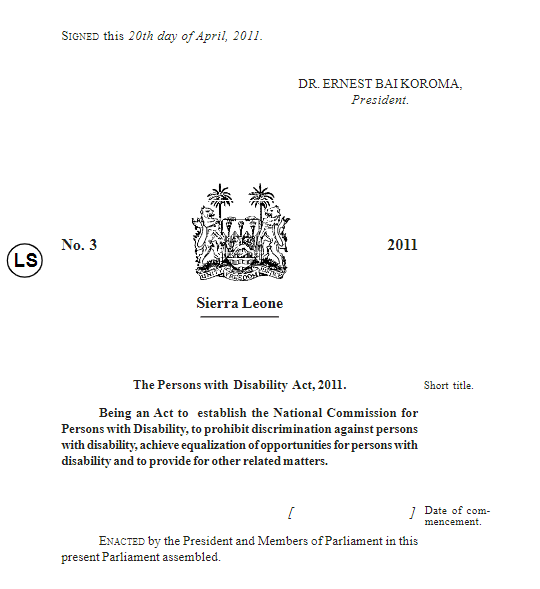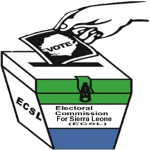VOTERS WITH DISABILITY
Every Sierra Leoneans deserve the right to votes. Therefore, voters with disability are not exception. ECSL strongly encourages voters with disability to make use of the opportunities to register and vote in all elections.
Services Available to Voters with Disabilities in Sierra Leone
Voter Registration
- People with disabilities have the right to register to vote so long as they are eligible, which means they:
- Are citizens of the Sierra Leone;
- Are at least 17 years and 10 months old at time of registration (but to vote, they must be 18 years of age by Election Day);
- Have not been finally convicted of a felony, or if they have been convicted, have completed all of their punishment, including any term of incarceration, parole, supervision, probation, or have received a pardon;
- Note: Deferred adjudication is not a final felony conviction.
- Have not been determined by a final judgment of a court exercising probate jurisdiction to be totally mentally incapacitated or partially mentally incapacitated without the right to vote.
- Individuals who have legal guardians may be eligible to register, depending on whether the court took away their right to vote. All guardianship orders must state whether the individual can vote.
- People with disabilities can receive assistance registering to vote from any state agency that provides services to persons with disabilities or from any person they choose.
Accessible Voting Systems
- ECSL is actively undertaking measures to ensure that all new voting systems be accessible to voters with disabilities and provide a practical and effective means for voters with disabilities to cast a secret ballot.
All Polling Places in Sierra Leone Must be Accessible
Polling places should support voters, not hinder them. When you go to the polls in Sierra Leone, you can expect:
- Your polling place will meet strict accessibility standards, including:
- A location on the ground floor that can be entered from the street
- Doors, entrances, and exits used to enter or leave the polling place
- Stairs necessary to enter or leave the polling place must have handrails on each side and a non-slip ramp
- Removal of all barriers such as gravel, automatically closing gates, closed doors without lever-type handles, or any other barrier that impedes the path of a person with physical disabilities to the voting station
- Voting systems that are accessible to voters with physical disabilities and can accommodate no vision, low vision, no hearing, low hearing, limited manual dexterity, limited reach, limited strength, no mobility, low mobility, or any combination of the foregoing (except the combination of no hearing and no vision)
- Each polling place will offer at least one type of accessible voting equipment. This equipment allows voters with disabilities to vote directly on the system or assist them in marking the paper ballot. Depending on the type of system, voters with disabilities may use headphones or other assistive devices to help them vote independently and secretly.
Voters May Receive Assistance at the Polls
If you need assistance at the polls, tell the election official if you are a voter who needs help to vote. You do not have to provide proof of your disability. Voters are entitled to receive assistance if they:
- Cannot read or write; or
- Have a physical disability that prevents them from reading or marking the ballot; or
- Cannot speak Krio, or communicate only with sign language, and want assistance in communicating with election officials.
Voters may be assisted by:
- Any person the voter chooses who is not an election worker;
- Two election workers on Election Day; or
- One election worker during early voting.
Voters MAY NOT be assisted by:
- Their employer;
- An agent of a political party; or
The person assisting the voter must read him or her the entire ballot, unless the voter asks to have only parts of the ballot read. The person assisting the voter must take an oath that he or she will not try to influence the voter’s vote and will mark the ballot as the voter directs. If the voter chooses to be assisted by polling place officials, poll watchers and election inspectors may observe the voting process, but if the voter asks to be assisted by a person the voter chooses, no one else may watch him or her vote.
It is illegal for a person assisting the voter to:
- Try to influence the voter’s vote;
- Mark the voter’s ballot in a way other than the way they have asked; or
- Tell anyone how the voter voted.
Voters May Use Interpreters at the Polls
Voters who cannot speak Krio, or who communicate only with sign language, may use an interpreter to help them communicate with election officials, regardless of whether the election official(s) attending to the voter can speak the same language as the voter. The voter may select any person other than the voter’s employer, an agent of the voter’s employer, or an officer or agent of a labor union to which the voter belongs. If the voter cannot read the languages on the ballot, the interpreter may also act as an assistant for the voter, but they must follow the procedures for an assistant. (See assistance section above for more details.) If the voter is deaf and does not have a sign language interpreter who can accompany them to help communicate with the poll worker or read the ballot, the voter should contact his or her local election officials before the election and request assistance.
Curbside Voting
If a voter is physically unable to enter the polling place, he or she may ask that an election officer bring a ballot to the entrance of the polling place or to a car parked at the curbside. After the voter marks the ballot, they will give it to the election officer, who will put it in the ballot box. Or, at the voter’s request, a companion may hand the voter a ballot and deposit it for him or her.
For additional information, contact:
ECSL Headquarter
OAU Drive, Tower Hill
Freetown, Sierra Leone
+23277487566
District Election Officials
For a list of district election officials, see the click on the icons on this map

The person with disability act 2011
Disability act 2011
